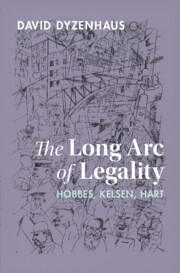Book contents
- The Long Arc of Legality
- The Long Arc of Legality
- Copyright page
- Dedication
- Contents
- Preface
- Introduction
- 1 The Puzzle of Very Unjust Law I
- 2 The Puzzle of Very Unjust Law II
- 3 The Constitution of Legal Authority / The Authority of Legal Constitutions
- 4 The Janus-Faced Constitution
- 5 The Politics of Legal Space
- 6 Legality’s Promise
- Book part
- Bibliography
- Index
3 - The Constitution of Legal Authority / The Authority of Legal Constitutions
Published online by Cambridge University Press: 13 January 2022
- The Long Arc of Legality
- The Long Arc of Legality
- Copyright page
- Dedication
- Contents
- Preface
- Introduction
- 1 The Puzzle of Very Unjust Law I
- 2 The Puzzle of Very Unjust Law II
- 3 The Constitution of Legal Authority / The Authority of Legal Constitutions
- 4 The Janus-Faced Constitution
- 5 The Politics of Legal Space
- 6 Legality’s Promise
- Book part
- Bibliography
- Index
Summary
This is more than Consent, or Concord; it is a reall Unitie of them all, in one and the same Person, made by Covenant of every man with every man, in such manner, as if every man should say to every man, I Authorize and give up my Right of Governing my selfe, to this Man, or to this Assembly of men, on this condition, that thou give up thy Right to him, and Authorize all his Actions in like manner. This done, the Multitude so united in one Person, is called a COMMON-WEALTH, in latine CIVITAS. This is the Generation of that great LEVIATHAN, or rather (to speake more reverently) of that Mortall God, to which wee owe under the Immortall God, our peace and defence.
Thomas Hobbes1- Type
- Chapter
- Information
- The Long Arc of LegalityHobbes, Kelsen, Hart, pp. 149 - 223Publisher: Cambridge University PressPrint publication year: 2022



